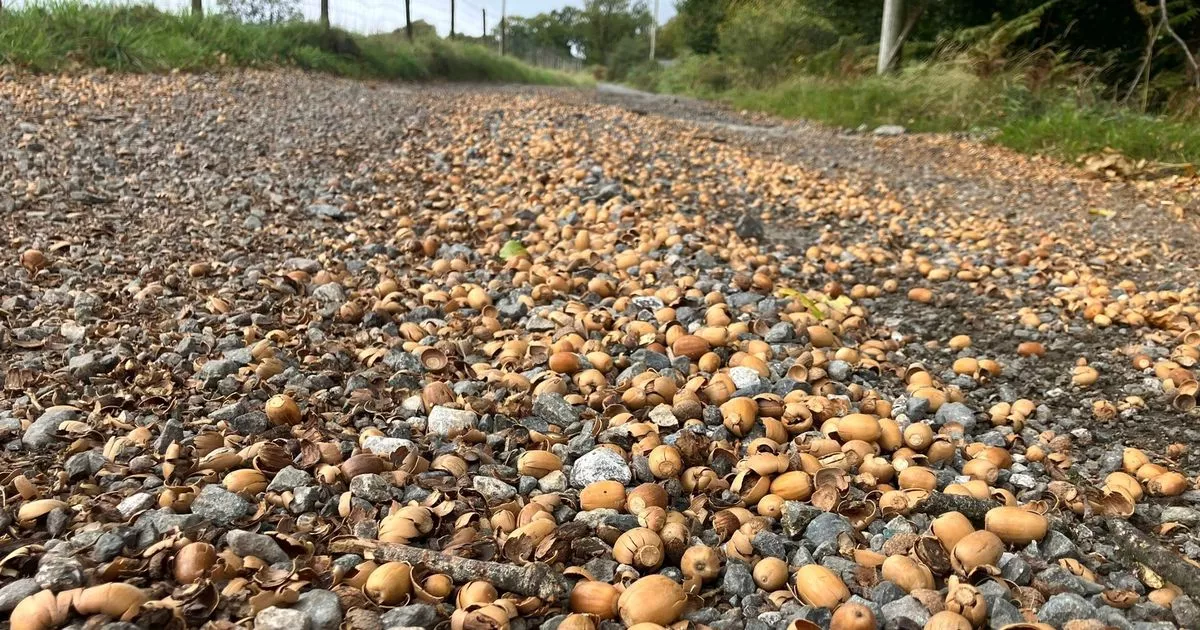By Andrew Forgrave
Copyright dailypost

A farmer is keeping an anxious eye on his sheep after losing 35 ewes to acorn poisoning. More are showing signs of illness and may die as there is no cure.
Geraint Davies, who farms Fedw Arian Uchaf near Bala, Gwynedd said that, after the long dry summer, he’d never seen fields covered with so many acorns. Although 210 ewes have been moved to hill land, away from oak trees, he now faces a two-week wait to find out if more animals succumb.
Already he’s looking at a potential £6,000 hit on the farm finances, once disposal costs are met and replacement ewes found. “We’ve just got to try and weather the storm,” he said. “A handful of sheep are showing similar signs and I just have to hope they don’t die as well.
“I’ve taken stock up on the mountain even though the grazing is not ideal for older ewes and it will affect grass availability for younger animals. But I couldn’t afford not to – I couldn’t risk any more falling ill.”
Acorns contain phenols and tannins that are toxic when eaten in sufficient quantities, causing kidney failure. Green acorns are particularly toxic.
This year they’ve dropped in huge quantities after what the Woodland Trust describes as a “mast” year for nuts and fruits. This usually follows a warm and dry Spring which creates ideal conditions for pollination.
“It’s unbelievable,” said Geraint. “The whole place is covered in a carpet of acorns. And there’s more to come, as the trees are yet to fully shed.” Join the North Wales Live Whatsapp community now
Last week a Carmarthenshire vet warned farmers of the dangers to sheep, cattle and horses. ProStock director Dr Rhys Beynon-Thomas said livestock can get “addicted” to them with fatal consequences.
Geraint first noticed signs of trouble when checking on his sheep last Thursday. After coming across two dead sheep in the first field he entered, he found more as his checks continued. Carcases appeared to be clustered near oak trees.
His suspicions were confirmed when post-mortem results from the Wales Veterinary Science Centre, Aberystwyth, found the ewes had died from severe acorn poisoning.
He said: “It’s been a nightmare to lose so many sheep and the most annoying thing is that we can’t treat the sheep when they start going downhill.
“Neither can we do much about the acorns. On this farm we have approximately 10 oak trees around each of its fields. They’re all 100 years-plus mature trees and the last thing we’d want to do is remove them.
“It makes you wonder if these kinds of bumper crops will become more frequent as the climate warms – and whether there’s any way of dealing with this issue.”
Acorn risks rise when large numbers are blown from the trees in stormy weather. Pigs are relatively immune to their effects and can be used to clear acorns.
Symptoms include appetite loss, constipation and tar-like faeces. Badly affected animals can die within 24 to 72 hours, others will linger for longer. Animals can survive but often they lose weight and become chronically unwell.
The only real way of preventing illness is to move livestock and horses from high-risk areas. Geraint said: “What’s happened is not ideal – the trade has been good this year and buying in replacement ewes will be expensive.
“On top of that, the disposal costs will come to around £20-a-head. I contacted my insurance company this morning and, while I’ve yet to hear back from them, other farmers say acorn poisoning is generally not covered. So it will be a big financial hit to the farm business.
“But in some ways we have been lucky – at least we had the option of moving stock to safer areas.”
Fedw Arian Uchaf is home to around 1,000 breeding ewes and 200 replacements. The farm noted for its conservation work – Geraint works closely with environmental groups to ensure thriving wildlife and rare bird populations on his land.
In recent days he’s been contacted by other farmers worried their stock may also have fallen victim to acorn poisoning.
“They’ve lost one or two animals and can’t understand why,” he said. “So I’ve been explaining the symptoms, such as blood in the muck and so on.
“All I can do now is highlight the dangers. For anyone with susceptible animals, it’s a case of being vigilant and acting swiftly if poisoning is suspected.” Sign up for the North Wales Live newsletter sent twice daily to your inbox
Find out what’s happening near you



